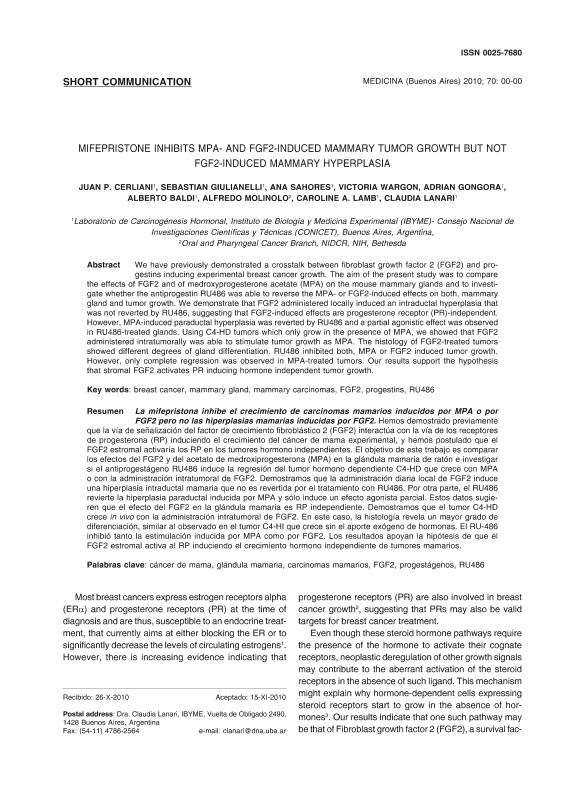Artículo
We have previously demonstrated a crosstalk between fibroblast growth factor 2 (FGF2) and progestins inducing experimental breast cancer growth. The aim of the present study was to compare the effects of FGF2 and of medroxyprogesterone acetate (MPA) on the mouse mammary glands and to investigate whether the antiprogestin RU486 was able to reverse the MPA- or FGF2-induced effects on both, mammary gland and tumor growth. We demonstrate that FGF2 administered locally induced an intraductal hyperplasia that was not reverted by RU486, suggesting that FGF2-induced effects are progesterone receptor (PR)-independent. However, MPA-induced paraductal hyperplasia was reverted by RU486 and a partial agonistic effect was observed in RU486-treated glands. Using C4-HD tumors which only grow in the presence of MPA, we showed that FGF2 administered intratumorally was able to stimulate tumor growth as MPA. The histology of FGF2-treated tumors showed different degrees of gland differentiation. RU486 inhibited both, MPA or FGF2 induced tumor growth. However, only complete regression was observed in MPA-treated tumors. Our results support the hypothesis that stromal FGF2 activates PR inducing hormone independent tumor growth. La mifepristona inhibe el crecimiento de carcinomas mamarios inducidos por MPA o por FGF2 pero no las hiperplasias mamarias inducidas por FGF2. Hemos demostrado previamente que la vía de señalización del factor de crecimiento fibroblástico 2 (FGF2) interactúa con la vía de los receptores de progesterona (RP) induciendo el crecimiento del cáncer de mama experimental, y hemos postulado que el FGF2 estromal activaría los RP en los tumores hormono independientes. El objetivo de este trabajo es comparar los efectos del FGF2 y del acetato de medroxiprogesterona (MPA) en la glándula mamaria de ratón e investigar si el antiprogestágeno RU486 induce la regresión del tumor hormono dependiente C4-HD que crece con MPA o con la administración intratumoral de FGF2. Demostramos que la administración diaria local de FGF2 induce una hiperplasia intraductal mamaria que no es revertida por el tratamiento con RU486. Por otra parte, el RU486 revierte la hiperplasia paraductal inducida por MPA y sólo induce un efecto agonista parcial. Estos datos sugieren que el efecto del FGF2 en la glándula mamaria es RP independiente. Demostramos que el tumor C4-HD crece in vivo con la administración intratumoral de FGF2. En este caso, la histología revela un mayor grado de diferenciación, similar al observado en el tumor C4-HI que crece sin el aporte exógeno de hormonas. El RU-486 inhibió tanto la estimulación inducida por MPA como por FGF2. Los resultados apoyan la hipótesis de que el FGF2 estromal activa al RP induciendo el crecimiento hormono independiente de tumores mamarios.
Mifepristone inhibits MPA-and FGF2-induced mammary tumor growth but not FGF2-induced mammary hyperplasia
Título:
La mifepristona inhibe el crecimiento de carcinomas mamarios inducidos por MPA o por FGF2 pero no las hiperplasias mamarias inducidas por FGF2
Cerliani, Juan Pablo ; Giulianelli, Sebastian Jesus
; Giulianelli, Sebastian Jesus ; Sahores, Ana
; Sahores, Ana ; Wargon, Victoria
; Wargon, Victoria ; Gongora, Adrian Daniel
; Gongora, Adrian Daniel ; Baldi, Alberto
; Baldi, Alberto ; Molinolo, Alfredo; Lamb, Caroline Ana
; Molinolo, Alfredo; Lamb, Caroline Ana ; Lanari, Claudia Lee Malvina
; Lanari, Claudia Lee Malvina
 ; Giulianelli, Sebastian Jesus
; Giulianelli, Sebastian Jesus ; Sahores, Ana
; Sahores, Ana ; Wargon, Victoria
; Wargon, Victoria ; Gongora, Adrian Daniel
; Gongora, Adrian Daniel ; Baldi, Alberto
; Baldi, Alberto ; Molinolo, Alfredo; Lamb, Caroline Ana
; Molinolo, Alfredo; Lamb, Caroline Ana ; Lanari, Claudia Lee Malvina
; Lanari, Claudia Lee Malvina
Fecha de publicación:
11/2010
Editorial:
Medicina (Buenos Aires)
Revista:
Medicina (Buenos Aires)
ISSN:
0025-7680
e-ISSN:
1669-9106
Idioma:
Inglés
Tipo de recurso:
Artículo publicado
Clasificación temática:
Resumen
Archivos asociados
Licencia
Identificadores
Colecciones
Articulos(IBYME)
Articulos de INST.DE BIOLOGIA Y MEDICINA EXPERIMENTAL (I)
Articulos de INST.DE BIOLOGIA Y MEDICINA EXPERIMENTAL (I)
Citación
Cerliani, Juan Pablo; Giulianelli, Sebastian Jesus; Sahores, Ana; Wargon, Victoria; Gongora, Adrian Daniel; et al.; Mifepristone inhibits MPA-and FGF2-induced mammary tumor growth but not FGF2-induced mammary hyperplasia; Medicina (Buenos Aires); Medicina (Buenos Aires); 70; 6; 11-2010; 529-532
Compartir



